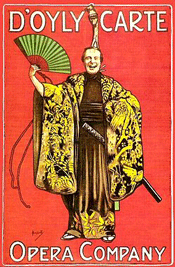Miller’s long-runners have been
ubiquitous on London’s operatic stages of late — Così and
Don Pasquale at Covent Garden, and (in combination with a new
L’elisir d’amore), La Boheme, Rigoletto
and now The Mikado at the Coliseum. And, the director’s
enthusiasm for revisiting and refreshing past projects seems undiminished:
having involved himself with this latest revival, he appeared on the opening
night to oversee the topsy-turvy affairs.
A superb cast rose to the occasion. As a no-nonsense Yum-Yum, Sophie Bevan
delivered ‘The Sun Whose Rays’ which brightness and buoyancy
— a moment of ‘normalcy’ among the mayhem. Alfie Boe —
kitted out with kiss-curl and blaring blazer — is a Tigger-ish Nanki-Poo,
all enthusiasm and bounce; perhaps a little uncertain of his dramatic direction
initially, Boe’s wide-eyed innocence came through more effectively in Act
2. His warm, flexible tenor conveyed both youth and sincerity, and matched
Bevan’s timbre and colour most pleasingly.
Alongside the drolleries of the young lovers’ courtship, Donald
Maxwell’s Pooh-Bah was hilariously haughty; he possesses a powerful
baritone, but his strong speaking voice boomed with equal sonority, his
Scottish brogue bellowing to the far reaches of the auditorium. Richard Angas,
a veteran Mikado of Japan, returned to the role once more; Angas was vocally
secure and presented a well-studied portrait of indifferent imperiousness, his
understated authority possessing just the right hint of menace.
Anne Marie Owens’ Katisha, glamorously be-jewelled, was perhaps not
sufficiently harridan-esque. She effectively brought out the pathos of the
role, but was rather too good at arousing our pity. And, she struggled at times
to project successfully. Claudia Huckle was more at home in the role of
Pitti-Sing: her contralto is clear and bright, and she acted the dialogue
entertainingly. Frances Canfield, as Peep-Bo, made the third of a fine trio in
‘Three Little Maids’, although the absence of choreography here
(when elsewhere all was manic movement and fizz) was rather a weakness.
The dialogue coach, Selina Cadell, has clearly worked hard to implant the
rules of cut-glass R.P. among the cast and chorus, and the distorted vowels
certainly come from the back of the throat. There’s always the danger of
over-kill, but here and through other conceits Miller captures the essential
‘artifice’ of the work. Nowhere is this made more wryly apparent
than with the extravagant preparations for Ko-Ko’s entry, which is
anticipated by the kowtowing court with trumpet voluntaries, elaborate
genuflections and splashes of rose-petal confetti, only for the
high-and-mighty-one to fail to appear … and so, eyes are rolled, grins
are fixed, petals are hastily gathered up and the entire sequence is repeated.
The zany choreography and props — sashaying headless servants and a
fat-suit for The Mikado — together with the over-bright, gleaming
lighting, add a frisson of surrealism and risk. Such details scratch at the
façade of the dazzling white-and-cream hotel lobby, and perhaps hint at the
latent instability of the edifice: Titipu may not ready to topple yet, but
there’s the danger of least a wobble or two.
In the pit, Peter Robinson kept things ticking along with precise and
well-judged comic timing; if anything the orchestra was a little
‘restrained’, but perhaps this was to allow the text to shine, and
Robinson was certainly sensitive to the singers in this regard.
The entire cast, including the shimmying maids and the bopping bell-hops,
were clearly having a marvellous party. The engine driving the show is,
however, the Lord High Executioner himself, Richard Suart, whose unprincipled,
unscrupulous Ko-Ko is effortlessly slick. Emphasising the Executioner’s
self-interest and opportunism, Suart’s Ko-Ko is deliciously cynical.
Surprisingly he manages to balance slapstick and hamming with innuendo and
suggestion. Casting an eye at both the political leader columns and the
celebrity gossip pages, his ‘little list’ of those ‘for the
chop’ has naturally been updated, and this time around deluded Arab
dictators, mincing coalition politicians, philandering footballers, affianced
royals and, inevitably, Silvio Berlusconi, all found themselves in the firing
line. Suart’s comic timing is superb; he pauses to relish the sharper
moments, before rushing on to the next joke, keeping the audience hooked,
ever-ready for the next bombshell. His mimicry is spot on, encompassing models
as divergent as Olivier’s Richard III, Frankie Howerd and Gordon
Brown.
The perfect visual and dramatic embodiment of G.K. Chesterton’s
observation that, in fact, none of the jokes in the play fit the Japanese but
‘all the jokes in the play fit the English’, Miller’s
1930’s hotel-foyer staging seemed inspired at its first appearance, has
proved itself both reliable and perpetually inventive, and is fast assuming the
epithet ‘classic’. At the end of this run, no doubt the costumes
will be carefully wrapped in tissue paper, as I don’t expect that this is
the last we’ve seen of this production. In contrast to the
‘victims’ on Ko-ko’s list, it really would be
missed.
Claire Seymour
